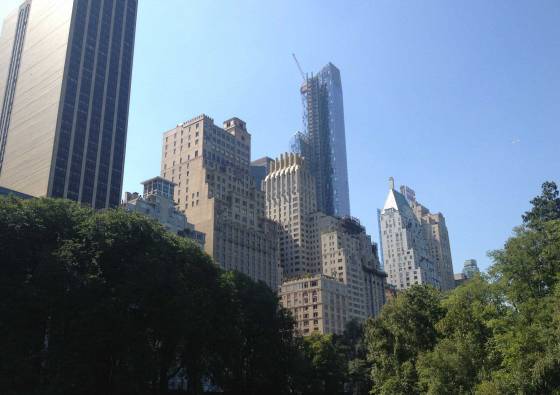"All the News That's Fit to Print.” That’s the motto of the New York Times, which recently published an op-ed called “London’s Laundry Business” that has sparked fiery reactions from some of journalism’s most renowned commentators on both sides of the pond.
The op-ed is by Ben Judah, a mid-20-year-old British-born Oxford graduate and Russia analyst.
Set against the backdrop of the unravelling crisis in the Crimea, he penned it a few days after British civil servant Hugh Powell left open on display to photographers a document advising that the Government should “not support, for now, trade sanctions,” nor should it “close London’s financial centre to Russians.”
Judah’s opinion is this: “Britain is ready to betray the United States to protect the City of London’s hold on dirty Russian money. And forget about Ukraine.” As he sees it, London has become a dirty centre of corruption where Oligarchs are not only driving up house prices in Mayfair and taking advantage of the old Empire’s tax havens, but informing the country’s political stance as well.
It’s hardly surprising that a number of people have supported the overall argument he presents. Indeed, there is little doubt imposing sanctions and ceasing assets would have knock-on diplomatic affects. What is surprising, however, is that he gave critics the ammunition to attack his thesis by couching it in between the lines of petulant hyperbole and bemusing factual inaccuracies about how the UK and its capital city have “changed.” A few examples for amusement:
- “Any moralising remnant of the British Empire is gone; it has turned back to the pirate England of Sir Walter Raleigh.”
- “What matters are banks, not tanks."
- “Britain’s bright young things now become…the oligarchs’ valets.”
- “London has changed. And the Shard - the Qatari-owned, 72-floor skyscraper above the grotty Southwark riverside – is a symbol of that change.”
- “The buses are still dirty."
- And my personal favourite: “On the [Shard’s] top floors, ultra high net worth individuals entertain escorts in luxury apartments.” As several critics have pointed out – no-one yet lives in the Shard…
Backlash to Brit bashing
Offended, the British media establishment fought back to protect the reputation of London, the City of London and Britain – Judah seems to conflate the three.
City AM editor Allister Heath responded with a thorough “fisking” of seven blatant falsities in the op-ed while Sean Thomas at the Daily Telegraph refuted what he refers to as a “rhapsodically stupid article” in his editorial, “Mile-high apartments full of trillionaire villains and their hookers: London according to the New York Times.”
John McDermott, Executive Comment Editor at the Financial Times who was previously based in New York, published a defence of London, comparing Judah’s “indiscriminate attacks on London” and “acidic op-ed” with Fyodor Dostoevsky dark and dirty account of the capital when he visited the Crystal Palace in 1862.
And in the Evening Standard (incidentally owned by a Russian billionaire), the Londoner was “reeling” and suggests that the Shard should “sue for the hurt of being accused of housing such debauchery.” In a little tit for tat, the Evening Standard also wrote a letter to the New York Times detailing the hypocrisy of printing the op-ed of its great rival city.
Despite of, or perhaps because of, the backlash, Judah tweeted victory ten days after the New York Times published his article:
B@b_judah: Britain's reputation is in crisis. Picking up on London op-ed from DC @EdwardGLuce in @FT concurs with my main point.
Cameron’s Britain has lost America’s respect, writes the Financial Times Chief US Commentator, and the US-UK “special relationship” has been compromised by the UK’s crisis of identity. “[Judah’s] argument would have sat comfortably in any British tabloid. But it drew on a strong underlying truth. Britain’s reluctance to impose tough sanctions on Russia is probably as much to do with BP’s large joint venture in Siberia – and the dividends it pays out – as from diplomatic calculation.”
In this view from across the pond, it would seem that while London’s special interests with Russia and its Mayfair-based Oligarchs are heating up, the UK’s bridges with the US are burning.
If Judah’s aim was to hang London’s reputation out to dry, he can claim victory indeed. And it makes you wonder if his provocative errors were intended after all.
Opinion Fit To Print?
Last September, at the height of the crisis in Syria, a byline published by the New York Times entitled “A Plea For Caution From Russia" by Vladimir Putin provoked similar media reaction. The Russian President felt compelled to "speak directly to the American people and their personal leaders" against the invasion of Syria just as Russian and American negotiators were meeting in Geneva over the conflict. It was a pure public relations coup.
Judah’s feat has likewise provoked colourful editorial reactions – even Her Majesty's Ambassador in Washington wrote a response to the New York Times about it – and creating conversation is exactly what op-eds ought to do.
While he might have sparked an important debate and made a point on the big picture of Russia’s influence in the London, however, his erroneous strokes of prose paint a dirty and damning picture of both the capital and the nation.
Wealth management publication Spear’s came to Judah’s defence saying that his mistakes “are decorative-tile facts - colour, as we call it in journalism - not building-brick facts.” But when it comes to reputation, decoration and colour matter. And in any case, Judah clearly did not get his facts on the Shard building right.
Should the New York Times – America’s "newspaper of record” which is incidentally under the leadership of former BBC Director General Mark Thompson – have pulled the plug on an op-ed so full of holes?
Perhaps Judah really does think that London’s buses are dirty, that Southwark is grotty, that debauchery in empty flats is considered a luxury by the uber-rich few. And of course, he is entitled to his opinion – at least when he gets the facts right.
But, rightly or wrongly, his views have become equated with those of the New York Times while the New York Times is perceived to reflect the way America views the UK. As BBC Radio 4 presenter Justin Webb says, “This cultural chasm lies at the heart of the New York Times broadside.”
Ironic, of course, that it is a Brit and not an American who wrote the op-ed. And fitting that the former Empire’s press fought back.






Comments